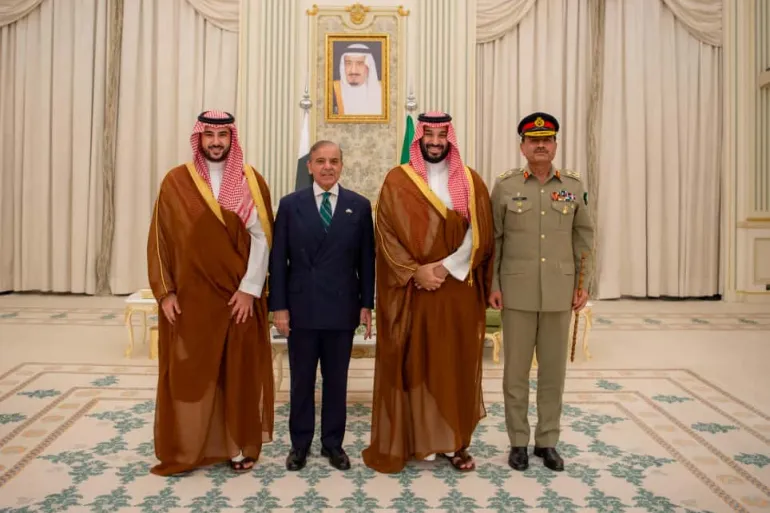ISLAMABAD, Sept 19: A new Saudi-Pakistan “strategic mutual defence agreement” is being hailed as a turning point in regional security politics, reported Al Jazeera.
The pact, signed in Riyadh by Pakistani Prime Minister Shehbaz Sharif and Saudi Crown Prince Mohammed bin Salman, commits both states to treat aggression against one as aggression against the other, signaling a deepening of their decades-old partnership.al
Sharif was welcomed with full royal protocol, F-15 flyovers and a red carpet at Al-Yamamah Palace, where the agreement was sealed in the presence of top Saudi officials and Pakistan’s senior military and civilian leadership. Pakistani diplomats called the accord a “shared commitment” to strengthen deterrence, regional stability, and joint security initiatives.
Analysts told Al Jazeera the deal is the most formal military guarantee Pakistan has ever extended beyond its borders. Asfandyar Mir of the Stimson Center called it a “watershed,” noting Pakistan’s previous defence treaties with the US collapsed in the 1970s and that even its close military ties with China have never been codified into a mutual defence pact.
Muhammad Faisal, a South Asia security researcher in Sydney, said the agreement formalises ongoing cooperation and could expand to joint training, defence production, and even a larger Pakistani troop presence on Saudi soil.
Why the Philippine-Japan defence pact matters

The deal comes at a volatile moment. Gulf capitals are shaken by two years of Israeli military actions—culminating in last week’s Israeli strike on Doha—and by a June war between Israel and Iran that included US-backed strikes on Iranian nuclear sites. The attack on Qatar, home to Hamas leaders and the forward headquarters of US Central Command, triggered an emergency GCC session and renewed talk of a joint Arab defence mechanism.
Pakistan’s alignment with Riyadh also intersects with its own fraught neighbourhood. In May, India and Pakistan exchanged missile and drone strikes over four days, their worst confrontation in decades before a ceasefire mediated, according to US President Donald Trump.
With tensions still high, the Saudi pact gives Islamabad a strong external partner at a time when New Delhi is exploring closer ties with Riyadh. India’s foreign ministry said it would “study the implications” of the agreement for its security and stability calculations, Al Jazeera added.
According to Al Jazeera, this deal may shift the balance in South Asia, where Pakistan has often depended on Saudi financial bailouts while Riyadh courted India. Faisal said the agreement represents “improved relative position” for Islamabad, providing leverage as it seeks to rebuild its economy and counter Indian pressure.
Still, the pact carries risks. Mir warned that Pakistan could be drawn into Saudi rivalries, particularly with Iran, with whom Islamabad has tried to maintain a working relationship despite recent border tensions. Saudi Arabia, for its part, is now formally tied to Pakistan’s disputes, including with India and the Taliban-led government in Afghanistan.
Saudi interest in nuclear technology adds another layer of complexity. Riyadh has repeatedly stated its uranium enrichment programme is for peaceful purposes, but Western officials have long speculated that Saudi leaders see Pakistan’s nuclear arsenal as a potential strategic hedge. Al Jazeera quoted security analyst Sahar Khan saying there is no evidence this pact includes a “nuclear umbrella,” but conceded it will intensify debate over whether Pakistan might one day extend such guarantees.
The US, which maintains about 50,000 troops in the region, may be wary of the pact. Washington has sanctioned Pakistan multiple times over missile development, and Biden administration officials have raised concerns about the reach of Islamabad’s weapons programmes. Khan told Al Jazeera that Pakistan must reassure Washington its nuclear posture remains “India-centric” and that it will not get pulled into Saudi conflicts.
Regional power politics are now in flux. The deal could accelerate efforts by Gulf states to diversify their security partners beyond the US, which remains Israel’s closest ally but whose commitment to defending Arab states has come under question. Egypt and Turkiye could emerge as additional partners in a broader Muslim security bloc, Faisal said, pointing out that Gulf countries are increasingly worried about relying solely on the American security umbrella.
For Pakistan, the pact could provide more than security. It may also bring new Saudi investment, military technology transfers, and expanded defence production opportunities. Both sides see it as a chance to institutionalise a relationship historically shaped by ad hoc troop deployments, financial bailouts, and religious diplomacy.
While some aspects remain opaque, analysts say the political symbolism is unmistakable. “This is the strongest statement of solidarity between Riyadh and Islamabad in decades,” Mir told Al Jazeera. “It raises Pakistan’s profile, projects deterrence and signals to both India and Iran that Pakistan is not isolated.”
Faisal, however, cautioned that despite the language of mutual defence, this remains largely a political commitment rather than a NATO-style binding alliance. Its effectiveness will depend on how far both capitals are willing to go if either faces real conflict. Still, he said, the agreement opens space for deeper coordination that could reshape security calculations across South Asia and the Gulf.
As Al Jazeera concluded, this pact represents not just a continuation of old ties but a recalibration of them, with both countries seeking to hedge against an unpredictable regional order. The deal is likely to be watched closely in Tehran, New Delhi, Washington, and Tel Aviv as they weigh its implications for the next round of crises.





































